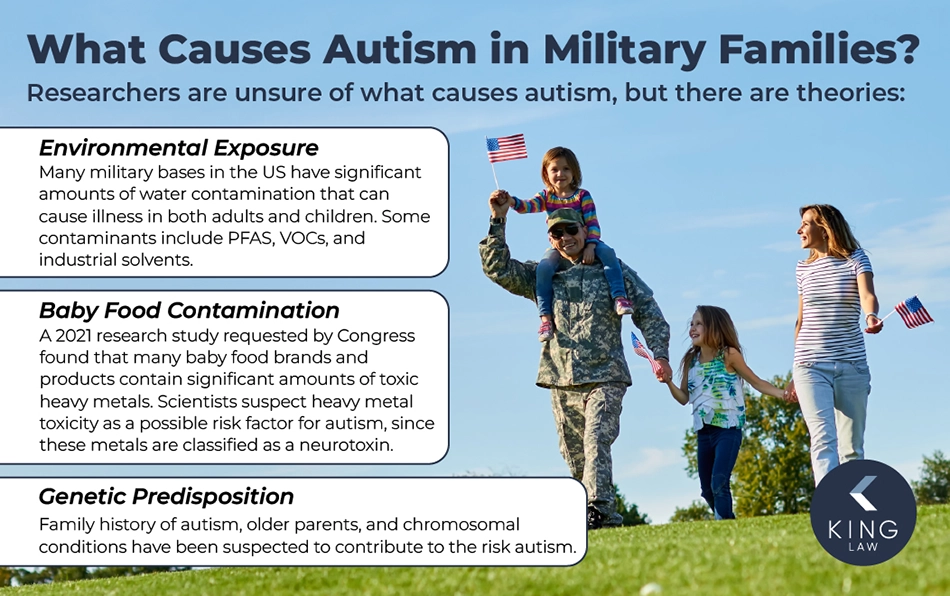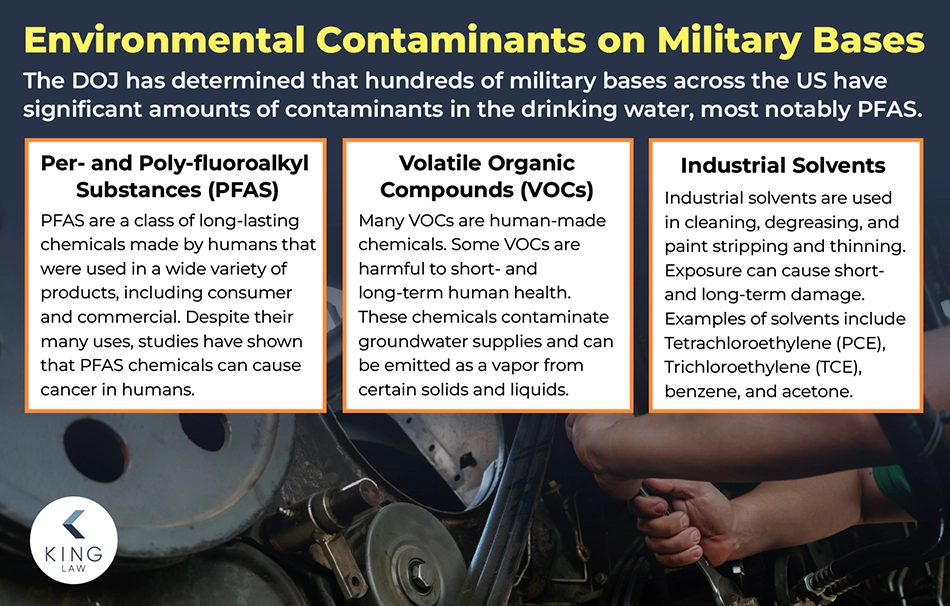
Military parents whose children have autism face unique challenges. For example, there can be barriers to accessing and maintaining care for their child. It can also be difficult to access and maintain any services a child receives. Additionally, relocation and deployments can place additional stress on military children with autism and their families.
As parents navigate these challenges, they may look for answers as to why their child developed autism. There is a growing body of science that links heavy metals in baby and toddler foods with autism. Many service men and women have relied on these foods to nurture their children. Unfortunately, those foods may have contained unsafe levels of toxins that hurt their children’s neurodevelopment.
On this page, you will find information about the rate of autism among service member families and the external factors that may influence this. This article also discusses the legal claims being filed by military families with a child with autism and who may be eligible for compensation.
About the Autism Military Lawsuit
Are Autism Rates Higher in Military Families
Common Environmental Risk Factors Faced by Military Families
Why Are Military Families Filing Lawsuits Related to Childhood Autism
Do Military Families Qualify for an Autism Lawsuit
What Compensation Could Military Families Receive in an Autism Lawsuit
Help for Military Families with Autistic Children
How to File an Autism Military Lawsuit
Are Autism Rates Higher in Military Families?
The most recent statistics available show the rate of autism diagnosis for military families and civilian families is equal. According to the CDC, by age eight, 1 in 31 children will be diagnosed with autism. However, data on this subject is lacking. Moreover, updated statistics are needed to better understand the rates of autism among military families.
Military families would benefit from knowing how common autism is in their community and, if so, why this might be the case. Military families are more frequently exposed to stressors and environmental factors that may make neurological conditions like autism, as well as anxiety and depression, more likely in those communities. Having access to updated statistics could help provide clarity and open the door to increased availability of effective services.
Autism Military Family Statistics
Multiple reports show that the rate of autism among service members is quite high. In 2010, the Organization for Autism Research estimated that 1 in 88 children of military parents had autism, which is the most recent year for which updated autism rates for military children are available. Around that time, in 2008, some estimated that the autism rates among 8-year-old children in the civilian population were about 1 in 88 for civilian communities surveyed by the CDC (although only 14 communities were surveyed). So, data from the two communities were comparable.
While organizations like the CDC have continuously assessed the autism rates for the civilian population, the same research has not been done for military children. According to TRICARE, about 60 percent of the 34,361 military children diagnosed with autism in 2020 had parents who were on active duty status. TRICARE also reported that 41 percent more dependents of military service members sought care for autism in 2022 than in 2015. Many researchers and advocates believe the actual number of military children with autism is much higher than the 2010 statistics available and that the rates of autism among military families are underreported.
What Affects the Rate of Childhood Autism in Military Families?
A host of different factors are thought to affect the autism rate for children of military personnel. These include:
- Exposure to toxins and contaminated water on military bases
- Heavy metals in baby foods
- Genetic factors, including a family history of autism
These are just a few of the potential reasons why children of service members may be diagnosed with autism. Military families may also face struggles in terms of accessing and continuing care because of how often they need to relocate. Each relocation requires them to re-register for services, schedule intake appointments, and adjust to the new setting, which can be a difficult transition for children with autism.
However, it is important for servicemen and women to remember that they are not responsible for their child’s autism diagnosis or the challenges surrounding it. Military families are doing the best they can to advocate and support their children.

Common Environmental Risk Factors Faced by Military Families
Growing evidence shows that environmental factors, like contaminated water and heavy metals in baby foods, can impact an infant’s neurological development. In turn, these exposures might increase the child’s risk of having autism or result in a lower IQ than their peers. For example, because of their line of work, military families may encounter toxins in their environment, such as their water supplies, food, and even housing. For example, toxic chemicals from the industrial fuels for tanks and other machinery may leak into the base’s water supply. These factors can impact children’s health and development.
Toxic Baby Food Linked to Autism
In 2021, a startling U.S. Congressional Oversight Committee Report revealed that many baby foods in the United States had unacceptable levels of heavy metals in them. The heavy metals studied included inorganic arsenic, lead, mercury, and cadmium. The popular brands of baby foods that were under fire for contamination included Gerber, Beech-Nut, HappyBABY, Parent’s Choice, Plum Organics, and Earth’s Best, all of which are staples for many military families.
According to the report, HappyBABY (manufactured by Nurture) sold products containing up to 180 parts per billion of inorganic arsenic. Beech-Nut’s products had 913.4 ppb of arsenic. For reference, the FDA only allows up to 10 ppb of inorganic arsenic in bottled water sold in the United States. High levels of other heavy metals, like lead, mercury, and cadmium, were found in the commercial baby foods as well.
For decades, studies have confirmed that heavy metals are known neurotoxins and can have negative impacts on a child’s cognitive ability and neurodevelopment. For instance, researchers have noted that lead exposure in early life can reduce a child’s IQ, especially if the child is exposed to lead over many years.
Scientists are also learning that children with autism have higher concentrations of mercury, lead, cadmium, and arsenic in their bodies compared to their neurotypical peers. Because of the recent findings in the 2021 Congressional Report and scientific literature, several organizations have launched initiatives, such as the FDA’s Closer to Zero Campaign, to help protect infants and young children by reducing the heavy metal content in baby foods.
Military Base Contamination
Unfortunately, water contamination at military bases is common and has been the subject of thousands of lawsuits filed by servicemembers. Contamination from water on or near the military base may also be a potential cause of a child developing autism.
For example, Camp Lejeune has been under fire because industrial solvents were found in the drinking water, causing many to experience leukemia, bladder, kidney, and liver cancer, and Parkinson’s Disease. Hundreds of other bases across the United States have been found to have contaminated water that is poisoning our nation’s military members. These chemicals may have also interrupted the neurodevelopment of infants and children in military families.
Additionally, aqueous film-forming foam (AFFF) was used on military bases to put out liquid fuel fires. Use of these foams is very common during training exercises. Despite some state and federal bans put in place, many installations still use AFFF because of how effective it is.
Unfortunately, AFFF contains perfluoroalkyl substances (PFAS or forever chemicals), which are highly toxic. These foams are linked to various cancers and can negatively impact a child’s neurological development. In 2023, the Environmental Working Group indicated that the water at 455 military bases contained PFAS.

Why Are Military Families Filing Lawsuits Related to Childhood Autism?
Many military parents may be surprised to learn that the common baby foods they fed their children could have led to their child’s autism diagnosis. Civilian and military parents across the country are filing lawsuits because their children ate contaminated baby food and developed autism. The parents believe the heavy metals in the baby food are to blame for their children’s neurological issues. Some of the legal claims in these cases accuse baby food companies of not doing more to reduce the amount of heavy metals in their products and of not warning the public of the known risks.
Many of these companies do not test their finished products. Only within the past years have some states started requiring baby food manufacturers to test baby foods for toxic metals.
For example, California started requiring such testing in 2025 by instituting AB 899. However, this law only requires that manufacturers post results on their labels via a QR code. Foods with elevated levels can still be purchased and consumed.
Because baby food manufacturers are not doing enough to protect American children from toxins in their foods, many parents are choosing to file lawsuits to hold them accountable for the damages these foods caused.
Do Military Families Qualify for an Autism Lawsuit?
Current or former service members who have a child who was diagnosed with autism may qualify for compensation through a lawsuit if:
- They fed their children one of the brands of baby food that was contaminated with heavy metals (such as Gerber or Parent’s Choice).
- They have proof that they purchased and used the baby food.
- They have medical records showing their child was diagnosed with autism after they ate the contaminated products.
Working with a seasoned attorney who has experience fighting for military families who have been wronged by large corporations can be helpful. These attorneys understand the product liability and personal injury laws that may apply to these cases.
What Compensation Could Military Families Receive in an Autism Lawsuit?
Military members who file claims because their child developed autism may be eligible for a range of compensation, including:
- Expenses paid to get their child diagnosed with autism
- Costs of occupational, speech, or other therapies
- Fees paid to get long-term care for their child
- Pain and suffering
The parents may also be able to recover damages for their or their child’s loss of income or earning capacity, especially if the parent had to step away from or reduce their service to care for their child. An attorney can help military parents determine the types of compensation they may qualify for and how to request it.
Help for Military Families with Autistic Children
One of the significant challenges facing military families is the frequent relocations active duty personnel may face. For many military families, they may find a good team for their children, but they may lose that team when the family has to move again. They may also face waitlists for services when they move to a new area.
The Department of Defense’s Exceptional Family Member Program (EFMP) was created to help make sure military families with special needs children are less likely to be sent on assignments that would interrupt their children’s care. However, many service members find it hard to benefit from these efforts because of the administrative hurdles involved. Military members cite concerns about how it impacts their career progression over time, as well as the unclear and inconsistent application of the program.
TRICARE is the insurance provider for many military family members, but it comes with limitations. For example, in a 2024 Military Family Lifestyle Report, the Blue Star Families organization found that over 90% of the active-duty survey participants said they had to wait longer than 3 months when seeking mental health care for a child. Surveyed families also said they struggled to find providers that would accept TRICARE insurance.
How to File an Autism Military Lawsuit
Military parents of children with autism can file a lawsuit by connecting with a knowledgeable attorney who can identify their legal rights. Parents may be able to accomplish this by submitting an online claim form to request a free case review. Then, the parents would work with their lawyer to investigate the cause of the child’s autism and write up a legal complaint to file with the court. Because there are technical filing deadlines that may be approaching, it is important for parents to act quickly to avoid losing out on potential compensation.
Contact King Law’s Attorneys for Affected Military Families
If you or your spouse is a member of the military and you have a child with autism, you may be eligible for compensation. Reports have shown that the heavy metals in baby food may be harming children’s neurological development. If you fed your child one of the contaminated commercial baby foods, you might have a legal claim against the manufacturers (like Gerber or Earth’s Best).
King Law has a long history of fighting for military family members, including those affected by Camp Lejeune and the PFAS contamination at dozens of military bases across the country. Our team is also part of the fight to help families whose children may have developed autism because of the heavy metals in their baby foods. Reach out to us today by calling (585) 496-2648 or filling out an online contact sheet to start your free case review.

